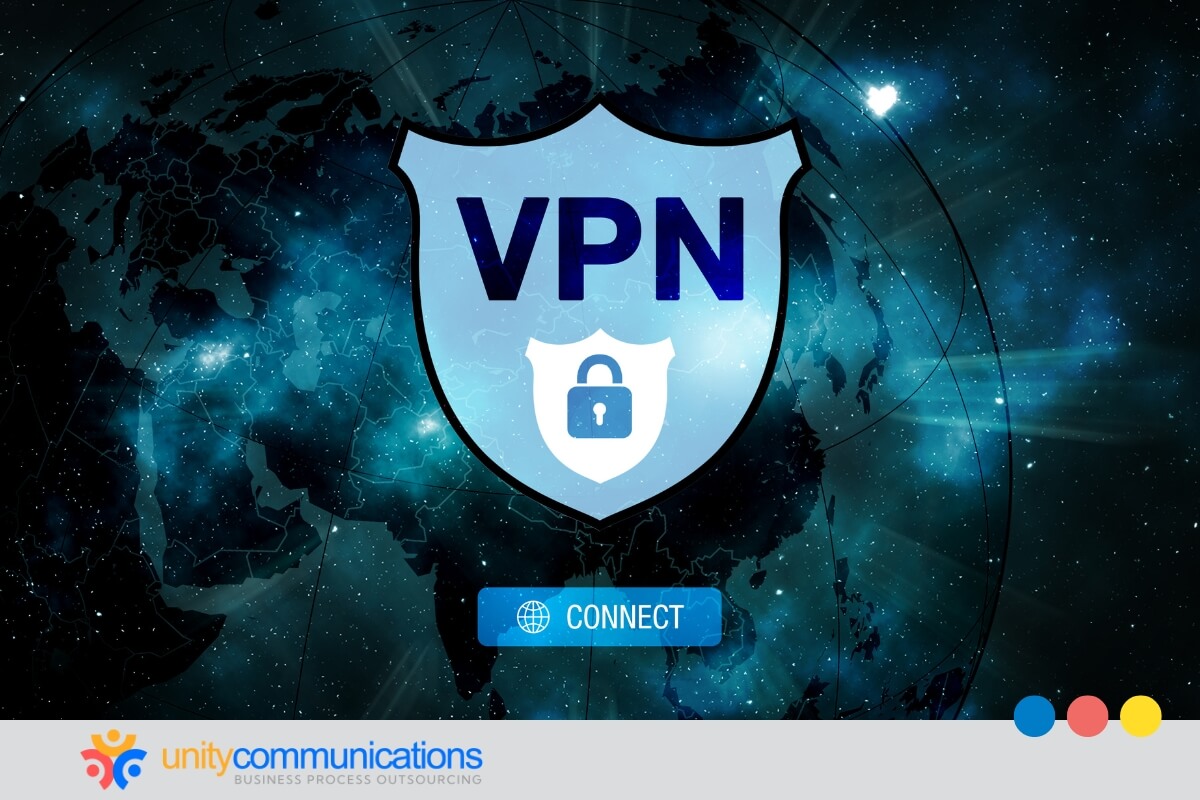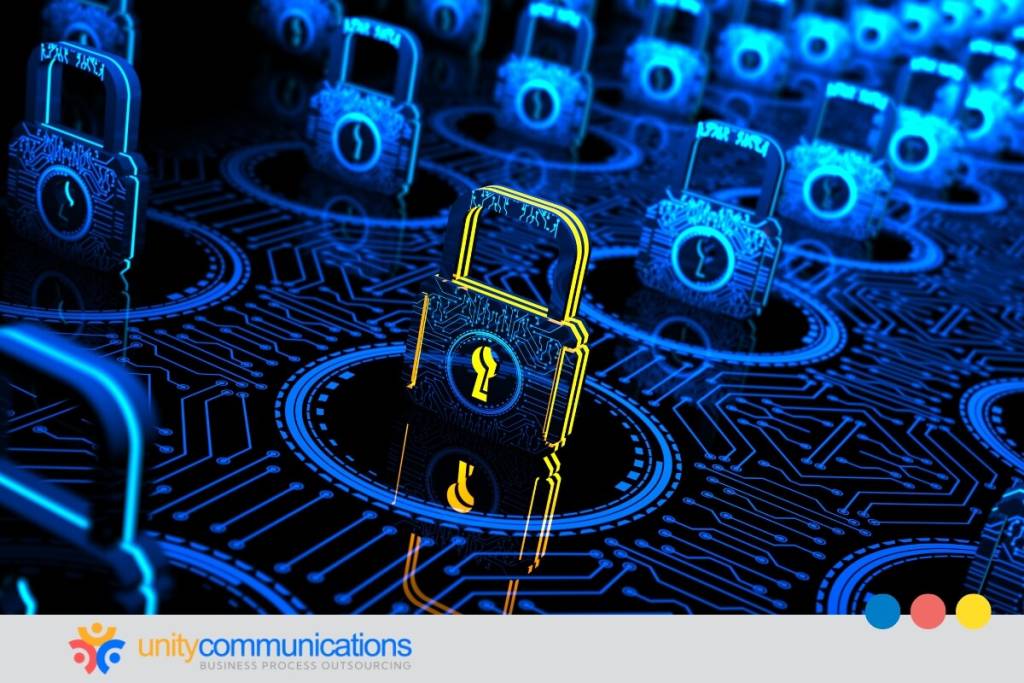Table of Contents
Did you know that 62% of businesses outsource human resource (HR) processes? Business process outsourcing (BPO) offers a cost-effective way to manage essential workforce functions. That includes payroll processing, recruitment, benefits administration, and more.
However, entrusting sensitive employee information to a third party carries inherent risks. Organizations must implement stringent security measures to safeguard confidential data and mitigate potential breaches.
This article explores the importance of ensuring data security in HR outsourcing. Read on to understand the key risks associated with third-party HR services and discover best practices for protecting sensitive employee information.
Why data security matters in HR outsourcing

To better understand the importance of data security in HR outsourcing, it’s best to first answer the question: What is BPO? It is the business practice of delegating specific functions to a third-party team.
In HR outsourcing, it involves subcontracting various tasks, including, but not limited to, the following:
- Payroll administration
- Employee benefits administration
- Recruitment and staffing
- Risk management and compliance
- Training and development
- HR strategy
- Employee relations
Outsourcing offers cost savings, access to expertise, improved compliance, and increased efficiency. This makes it a widespread practice across businesses of all sizes and industries. According to Deloitte’s 2023 Global Shared Services and Outsourcing Survey, 62% of enterprises outsource HR tasks.
However, HR teams handle vast personal and financial employee data, making them prime targets for cybercriminals. Delegating this function to an external party also means sharing sensitive information. A single data breach can result in financial loss, reputational damage, legal penalties, and a loss of employee trust.
Key risks in HR outsourcing
The key to ensuring data security in HR outsourcing is to be aware of the risks that come with it. This can help you comply with industry regulations, protect confidential information, and maintain operational integrity.
Identifying these threats helps businesses to implement effective controls that safeguard employee information.
1. Unauthorized access to confidential information
HR outsourcing providers handle sensitive data such as social security numbers, salary details, medical records, and performance evaluations.
Without proper access controls, unauthorized individuals might access the information. This risk goes beyond external hackers. It includes the possibility of breaches within the outsourcing company.
A rogue employee can view, copy, or inappropriately use sensitive employee data, potentially resulting in identity theft, discrimination, or other threats.
2. Data breaches and cyber threats
According to HR Magazine, data breaches targeting employee information increased 41% in 2023. The interconnected nature of digital systems means bad actors can exploit even the slightest vulnerability in the outsourcing provider’s network.
This increases the risk of cyberattacks, including:
- Malware (viruses, worms, ransomware, spyware, and trojans)
- Phishing (emails, text messages, fake websites, spear phishing, and whaling)
- Denial-of-service (DoS) and distributed denial-of-service (DDoS) (overwhelming a target system with excessive traffic, making it unavailable to legitimate users)
- Man-in-the-middle (MitM) attacks (Wi-Fi eavesdropping, session hijacking, and HTTPS spoofing)
- SQL injection (exploiting vulnerabilities in web applications to inject malicious SQL code into databases, allowing attackers to steal or modify data)
With threats growing in sophistication and scale, organizations must take proactive steps to secure their HR data. This starts with clear security protocols, trusted outsourcing partners, and continuous system monitoring.
3. Compliance and regulatory violations
Ensuring data security in HR outsourcing requires adherence to various data protection laws, such as the following:
- The General Data Privacy Regulation (GDPR) in the European Union
- The California Consumer Privacy Act (CCPA)
- The Health Insurance Portability and Accountability Act of 1996 (HIPPA) for healthcare organizations
Navigating the complex landscape of data protection laws is crucial, as a BPO provider’s failure to comply with these laws can affect your business. It can result in significant legal penalties even if the breach is the outsourcing provider’s fault.
4. Data ownership and control issues
When outsourcing HR functions, you might lose direct control over data management. If an agreement does not clearly define data ownership, you might face difficulties accessing, modifying, or deleting employee records.
Accessing critical employee records could become grueling during provider bankruptcy or contract termination. Learning how to write a service-level agreement (SLA) when outsourcing is critical.
Evaluating HR outsourcing providers for security and compliance

The data risks that come with HR outsourcing can become severe if your BPO provider lacks robust security measures. Choosing the right HR outsourcing partner can save you from data breaches.
However, this process requires carefully assessing their security policies and compliance framework. To ensure data security in HR outsourcing, consider the following factors when evaluating potential partners:
1. Security certifications and compliance standards
The ISO 27001:2022 (information security management) or SOC 2 (service organization control) standards are great certifications to look for in a BPO provider.
These certifications require rigorous audits and ongoing compliance. A BPO company that invests in these credentials shows they take data security seriously.
These standards provide a structured framework for managing information security risks, including policies, procedures, and controls to protect sensitive data.
2. Incident response and breach notification policies
A well-documented incident response plan can be significant in ensuring data security in HR outsourcing. Inquire about how your shortlisted BPO providers handle security breaches. These should include their notification procedures, mitigation strategies, and recovery plans.
Here are some essential questions to ask:
- Detection and analysis: How does the provider detect and analyze security incidents?
- Containment: How does the provider contain the spread of a breach?
- Eradication: How does the BPO company remove the threat and restore affected systems?
- Recovery: How does the provider restore data and services?
- Post-incident review: How does the third-party team analyze the incident to prevent future occurrences?
- Notification timeline: How quickly will the provider notify your company of a breach?
- Notification channels: How will they notify your company (email, phone, secure portal)?
- Notification content: What information will the provider include in the notification (details of the breach, affected data, mitigation steps)?
- Notification to affected individuals: What is the provider’s procedure for notifying the individuals who have had their data compromised?
Clear, timely breach response is critical to minimizing damage and maintaining trust. Choosing a provider with a transparent, well-structured incident response plan ensures your organization is prepared when every second counts.
3. Transparency in data handling and processing
Outsourcing providers should be transparent about storing, processing, and managing employee data. You should request documentation on data lifecycle management, access policies, and third-party involvement.
Here are some factors to inquire about:
- Data lifecycle. “Walk me through the complete lifecycle of employee data, from onboarding to secure deletion, including storage and backup locations.”
- Encryption. “What encryption methods are used for data in transit and at rest, and what specific standards are applied?”
- Access control. “Describe your user roles and access levels and how user accounts are provisioned and de-provisioned.”
- Access logs and audits. “How often are access logs audited, and what procedures are in place for detecting unauthorized access?”
- Compliance documentation. “Provide documentation of your compliance with relevant data protection regulations, including audit reports and certifications like ISO 27001 and SOC 2 Type 2.”
Transparency builds trust. Partnering with a provider that offers full visibility into their data handling practices helps you meet compliance obligations and protect sensitive employee information with confidence.
4. Customizable security controls
Reputable HR outsourcing providers customize security controls to align with clients’ needs. This includes options for enhanced encryption, access control, and additional compliance measures.
To ensure the data security measures of your HR outsourcing provider are robust, look for these factors:
- Flexible architecture. The provider’s system can accommodate customization without requiring significant modifications.
- Clear documentation. The provider should document available security controls and how to customize them.
- Expert support. The BPO company should help clients configure and manage their customized security controls.
- Contractual agreements. All customized security controls should be clearly documented within the contracts.
Customizable security controls allow you to tailor protections to your specific HR data risks and compliance needs. Choosing a provider with flexible controls, clear documentation, expert support, and contract clarity helps keep your data secure and compliant.
Top data security best practices in HR outsourcing

Securing data goes beyond preventing cyberattacks. It also involves implementing proactive measures that align with legal requirements and industry best practices. Taking security seriously can reduce fraud exposure, identity theft, and compliance violations.
The following strategies help ensure data security and compliance in HR outsourcing:
- Implement strong data encryption protocols. These approaches protect employee information during transmission and storage. Companies should require their outsourcing partners to apply industry-standard encryption protocols such as AES-256 for data encryption at rest and TLS 1.2 or higher for securing data during transmission.
- Limit access with role-based access controls (RBAC). Limiting data access based on job roles minimizes the risk of unauthorized exposure. HR outsourcing providers should restrict access to only authorized personnel.
- Prevent unauthorized access with MFA. Using multifactor authentication (MFA) to access HR systems adds an extra security layer. This measure prevents unauthorized logins, even with compromised credentials.
- Audit security controls and monitor for threats. Continuous monitoring and periodic security audits help identify vulnerabilities and ensure compliance with established data protection standards. Businesses should establish a process for conducting independent audits of their outsourcing partner’s security practices.
- Ensure secure data transfer methods. Secure file transfer protocols (SFTP) and virtual private networks (VPNs) help prevent data interception during transmission. Outsourcing providers should avoid using unsecured email or external drives to share sensitive HR files.
- Train employees in cybersecurity best practices. In-house and BPO teams should undergo regular cybersecurity training to stay updated on threats and mitigation strategies. Employees should recognize phishing attempts, secure password management, and incident reporting procedures.
- Implement data backup and recovery plans. A robust data backup and recovery strategy supports business continuity during cyberattacks or system failures. HR outsourcing providers should maintain secure, regularly updated backups in encrypted formats.
By adopting these best practices, companies can significantly strengthen their HR data security posture and minimize risks. This also helps build trust in outsourcing partnerships, setting the stage for effective collaboration and compliance throughout the HR lifecycle.
The bottom line
Ensuring data security in HR outsourcing is a critical priority to keep sensitive employee and business information safe.
By understanding the risks involved, carefully evaluating outsourcing providers, and implementing best practices, you can protect against such risks. That includes data breaches, compliance violations, and unauthorized access.
If you’re looking for an HR BPO provider that takes data security seriously, let’s connect. Unity Communications is ISO 27001:2022-certified.




